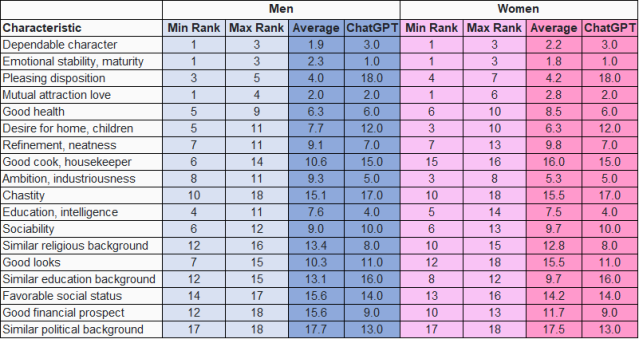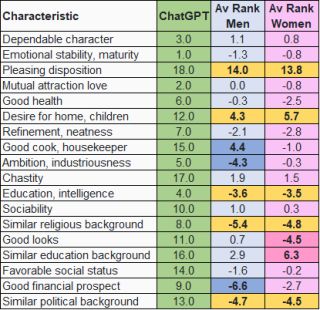Mating
What ChatGPT Gets Wrong About Dating
Can AI predict what men and women want in a mate?
Posted February 9, 2023 Reviewed by Vanessa Lancaster
Key points
- Despite decades of research to the contrary, ChatGPT predicts that men and women want exactly the same qualities in a mate.
- AI overlooks all sex differences and underestimates the importance of having a partner with a pleasing disposition.
- Use caution when using AI to guide self-improvement or to understand the desires of the opposite sex.
Like many others, I am sometimes blown away by what modern AI tools can accomplish. Recently, there has been a flurry of activity on social media where people have tried to find out more about the disposition (such as political perspective) and limitations of ChatGPT.
There is growing concern online that the West is experiencing a "mating crisis" with sexlessness and singlehood slowly becoming the default setting of the younger generation–and not always by choice. Naturally, I was curious to find out whether ChatGPT might be a useful tool for singles, giving inexperienced and clueless young men and women insight into the mate preferences of each sex.
Mate preferences are fairly rigid over time.
Mate preferences have been studied for decades, particularly from an evolutionary perspective, showing quite robust patterns over time. Studies that have given participants 18 traits to “rank” in terms of importance show little change from the start of the second world war to 2008. For example, women in 1939 ranked “Dependable character” as the second most important trait in a man, and this rank has fluctuated between number one and three since. There have been some changes; “Mutual attraction and love” has increased from number four (in men) and number six (in women) to number one over time. But generally speaking, traits hover around the same level of importance, revealing the somewhat rigid nature of mate preference development.
You might forgive young men and women who overlook peer-reviewed studies when trying to understand the opposite sex, choosing more accessible mediums like TikTok, Twitter, and now open-access AI for answers instead. So, I embarked on an experiment to discover whether ChatGPT gives correct information about mate preferences.
The ChatGPT Experiment
To investigate, I gave ChatGPT the 18 characteristics from the mate preferences work above. Then, I asked it to take on the perspective of a young, heterosexual man looking for a long-term partner. Next, I asked it to rank the traits in order of importance. Finally, I asked it to repeat the exercise after adopting the perspective of a heterosexual woman looking for a long-term partner.
This all happened just after 7 a.m. on February 7, 2023. By comparing the responses that ChatGPT gave me to the average rank men and women gave to each trait across time, I was able to see what it got right about the desires of each sex and what it got wrong. The results were interesting, to say the least.
ChatGPT assumes men and women want exactly the same things.
I started by looking at men and women separately, seeing where ChatGPT got it right and wrong for each sex. It was only when I correlated ChatGPT’s predictions for men with its predictions for women that I was met with a perfect correlation of r = 1. After a double-take and a double-check, it was confirmed: ChatGPT told me that the mate preferences of young heterosexual men and women were identical.
There are two things to say about this. First, there is a grain of truth here. Men and women have ranking profiles that correlate quite strongly (about r = .87). That means there are a lot of similarities and that if something is important to one sex, then it’s unlikely to be unimportant to the other. This goes against the “men and women are different species” narrative you sometimes see on social media. The reality is that the sexes generally want the same things but to varying degrees.

Understanding sex differences is important.
Second, glossing over sex differences can be problematic, particularly for those trying to make themselves more appealing. In all, the correlation between what ChatGPT says a sex wants and what they typically want is r = 0.57 for men and r = 0.60 for women–strong but definitely imperfect correlations. Women care less than men about a partner’s ability to be a “Good cook and housekeeper” and have “Good looks” by more than five ranks on average. In comparison, men care less than women about a partner’s “Ambition and industriousness” and “Good financial prospects” by about four ranks.

Because of this, men who focus on enhancing their looks or household prowess and women who focus on earning money and demonstrating ambition risk overestimating how well these efforts increase their desirability as a mate. They overlook opportunities to enhance more universally important traits, like dependability and maturity, or traits slightly more important to the opposite sex.
The Sex Differences ChatGPT Gets Wrong
Looking at differences of three ranks or more, ChatGPT:
- Underestimates how important “Good cook, housekeeper” is for men (4.4 ranks)
- Overestimates how important “Ambition, industriousness” is for men (4.5 ranks)
- Overestimates how important “Good financial prospects” are for men (6.6 ranks)
- Underestimates how important “Similar education background” is for women (6.3 ranks)
- Overestimates how important “Good looks” are for women (4.5 ranks)
What else does ChatGPT get wrong?
Ignoring sex differences for a moment, what does ChatGPT get wrong more broadly? Again, just focusing on differences of three ranks or more, ChatGPT:
- Underestimates the importance of “Pleasing disposition” (13.9 ranks)
- Underestimates the importance of “Desire for home, children” (5 ranks)
- Overestimates the importance of “Education, intelligence” (3.6 ranks)
- Overestimates the importance of “Similar religious background” (5.1 ranks)
- Overestimates the importance of “Similar political background” (4.6 ranks)
Pleasing disposition is completely overlooked.
Choosing a long-term partner, living with them, and merging your lives is a huge commitment. Pair-bond with the wrong person and the resulting strife, conflict, and turmoil can have a cumulative impact on one’s mental and physical health. It comes as no surprise then that a partner’s pleasing disposition has typically held a ranking of number 4in the list since the 1940s.
By ChatGPT’s definition, "Pleasing disposition" means:
manner or demeanor that is attractive and agreeable to others. It refers to a personality trait characterized by a friendly and likable demeanor, a positive attitude, and good social skills. A person with a pleasing disposition is generally easy to be around and makes others feel comfortable and at ease.
But according to ChatGPT, having a long-term committed partner who is easygoing, likable, and makes one feel comfortable is the last thing on the minds of single men and women. This a potential disaster for those taking its advice on mate preferences as gospel.
Conclusion
AI technology like ChatGPT is still relatively novel, and its accuracy depends on the information it’s fed (garbage in, garbage out). Over time, it may well be that advanced AI tools can access and amalgamate all the high-quality research about mate preferences and generate tailored pathways to help improve one’s attractiveness as a mate.
Until such a time, users should be cautious about its advice and pay more attention to the robust and often nuanced findings from apolitical relationship research.
References
Boxer, C. F., Noonan, M. C., & Whelan, C. B. (2015). Measuring mate preferences: A replication and extension. Journal of Family Issues, 36(2), 163-187.
Buss, D. M. (1989). Sex differences in human mate preferences: Evolutionary hypotheses tested in 37 cultures. Behavioral and brain sciences, 12(1), 1-14.




